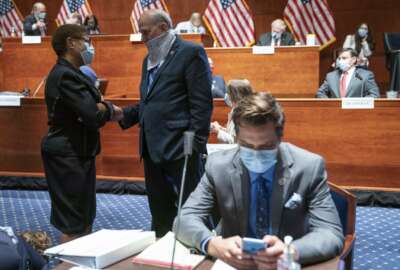
Will the coronavirus be the push Congress needs to modernize long-standing inefficiencies?
Proxy voting with or without quorum, video hearings, limiting member travel and maintaining social distancing at the Capitol have required lawmakers to reconsider...
It’s doubtful that finding ways to conduct business during a global pandemic was high on the list of reasons for forming the Select Committee on the Modernization of Congress in 2019. But now, the timing could scarcely be more appropriate.
Proxy voting with or without quorum, video hearings, limiting member travel and maintaining social distancing at the Capitol have required lawmakers to reconsider the long-term viability of some well-established practices. For committee Chairman Rep. Derek Kilmer (D-Wash.), it meant picking up new skills quickly.
“I think there’s a few different things at play. One, each member in their district is really active right now and has been through the course of this pandemic, in part, because there’s a lot of holes in the dam,” he said on Federal Monthly Insights ꟷ Operational Resiliency. “And I think most members of Congress and their staffs are trying to use every finger and every toe to plug those holes. Some of that is just doing really active case work with local businesses, or, you know, there’s members of Congress, myself included, who become, you know, procurement professionals, when it comes to personal protective equipment, and testing capacity.”
He also said passing legislation for necessary resources such as the Paycheck Protection Program is pressing. But so is oversight, especially as trillions of federal dollars go out the door to businesses and individuals in the form of stimulus checks and unemployment. Kilmer and Tom Graves (R-Ga.), vice chairman of the modernization select committee, are also on the Appropriations Committee which is making use of virtual meetings.
But working from local district offices has not been easy either. Graves said it had been “a remarkable 90 days of adjustment and adaptation.”
“We’ve seen in the district offices that every office has managed it a little bit different,” he said on Federal Drive with Tom Temin. “Some have moved to more of a total virtual element, or a hybrid of that where staff can come in, you know, one or two staff per day and sort of rotate through that, to maybe oftentimes not any staff throughout the week or work remotely.”
Getting around limited Wi-Fi and a dependency on Ethernet was a major challenge for district offices, he said members found, leading some staff to use their phones as hot spots.
For members who need to hold virtual town halls, Kilmer said, the question arose of Congress bulk purchasing video conference subscriptions to keep constituent communications open.
“You’ve seen the Executive Branch, implement some innovations during the pandemic where Congress could also take action. So for example, the requirement for wet signatures, obviously, when members of Congress are dispersed all over the country, that’s pretty tough,” Kilmer said. “And so looking at accelerating the use of digital signatures is something that Congress so far has not really taken advantage of, and I think is something that will require a look and may likely see a recommendation from our committee.”
Meanwhile, the select committee has suggested easier tracking of legislation and members’ voting records to improve transparency.
Until a vaccine for the coronavirus is found, Kilmer said it’s unlikely all 435 members of Congress and their staff will return to the Capitol together. But with the select committee set to end this year, Kilmer said getting its recommendations to the larger body “can’t wait.”
Copyright © 2025 Federal News Network. All rights reserved. This website is not intended for users located within the European Economic Area.
Amelia Brust is a digital editor at Federal News Network.
Follow @abrustWFED




